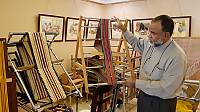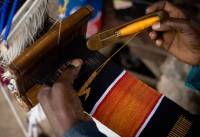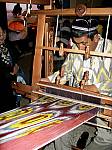
Traditional weaving of Al Sadu
ribed,Traditional weaving of Al Sadu Traditional weaving of Al Sadu refers to the traditional woven textile made by Bedouin women: in Arabic, ‘Al Sadu’ means weaving done in a horizontal style. The weaving is a form of warp-faced plain weave made on a ground loom. The cloth forms a tightly woven, durable textile and the weavers make use of natu... Saudi Arabia
, Kuwait
appreciation to China for submitting its second report on the status of the element ‘Traditional Li textile techniques: spinning, dyeing, weaving and embroidering’, inscribed in 2009 on the List of Intangible Cultural Heritage in Need of Urgent Safeguarding, which was initially due for submission by 15 December 2017; Takes note of the efforts...18 December 2021
Online
xpresses its thanks to China for submitting its report on the status of the element ‘Traditional Li textile techniques: spinning, dyeing, weaving and embroidering’, inscribed in 2009 on the List of Intangible Cultural Heritage in Need of Urgent Safeguarding; Takes note of the continued efforts undertaken by China to safeguard the element and, i...9 December 2017
Jeju Island
ation to China for submitting, on time, its third report on the status of the element ‘Traditional Li textile techniques: spinning, dyeing, weaving and embroidering’, inscribed in 2009 on the List of Intangible Cultural Heritage in Need of Urgent Safeguarding; Takes note of the efforts described in the report submitted by China to safeguard the...3 December 2022
Rabat
19.COM : Examination of requests for transfer of elements from one list to the other
The Committee, Recalling the initial inscription of ‘Traditional Li textile techniques: spinning, dyeing, weaving and embroidering’ on the List of Intangible Cultural Heritage in Need of Urgent Safeguarding by the fourth session of the Committee in 2009 (Decision 4.COM 14.04), Further recalling the latest periodic report submitted by China on...6 December 2024
Asunción
Sustaining Seperu folk dance and associated practices
,Tais, traditional textile Tais is a form of traditional weaving produced at home or in small groups by women in Timor-Leste, which has been transmitted from generation to generation through oral tradition. The styles and colours vary from one municipality to the other. The cloths are traditionally made of cotton with natural dyes. It used to be ve... Botswana
2023-08-02 - 28-02-2025
Craftsmanship of traditional woven textile Kente
inscribed,Craftsmanship of traditional woven textile Kente In Ghana, Kente is a fabric made of strips that are woven from silk, cotton or rayon using horizontal looms. The age, social status and gender of users influence the choice of colour and design of the fabric. Finished products are named with proverbs, sayings and social situations, among ot... Ghana
Al Sadu Educational Programme: Train the trainers in the art of weaving
orary weaving techniques and how to transmit this traditional craft to students. End-of-year school textile artwork exhibitions are also hosted at Sadu House to showcase the programme outcomes. Since the programme's inception in 2018, 30,959 students have completed the course, and sixty male and female art teachers from the six school district... Kuwait
l atlas and adras making through innovative training sessions, exhibitions and craft fairs, traditional textile festivals, and the publication of safeguarding materials and manuals. The CDC also promotes the use of natural materials, and supports the transmission of knowledge and skills about nature and the universe and their role in ensuring peopl... Uzbekistan
that Cambodia has nominated Cultural practices and expressions linked to Krama, a traditional woven textile in Cambodia (No. 02115) for inscription on the Representative List of the Intangible Cultural Heritage of Humanity: Krama is a woven textile associated with traditional practices and cultural expressions of the daily life in Cambodia. A rect...6 December 2024
Asunción






